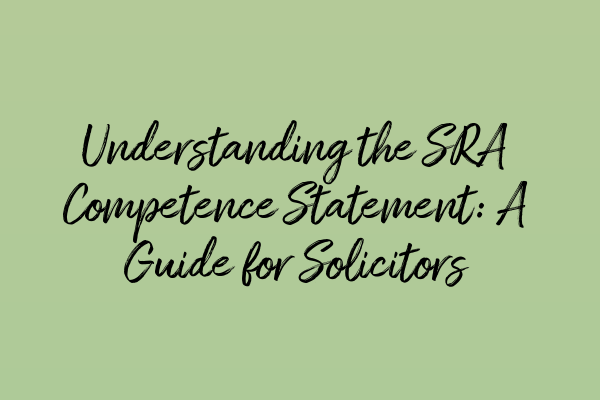Understanding the SRA Competence Statement: A Guide for Solicitors
As a solicitor, it is crucial to remain updated and well-versed in the legal landscape. The Solicitors Regulation Authority (SRA) has consistently emphasized the importance of competence in the legal profession. In order to ensure that solicitors meet the highest standards of professional competence, the SRA has introduced the SRA Competence Statement. In this blog post, we will delve into the details of the SRA Competence Statement, its significance, and how it can be effectively applied in your legal practice.
First and foremost, let’s understand what the SRA Competence Statement is. The SRA Competence Statement outlines the essential skills and knowledge that solicitors should possess in order to provide competent legal services to their clients. It serves as a benchmark for solicitors to assess and develop their professional competence throughout their careers.
The SRA Competence Statement consists of three key elements: ethical conduct, technical legal practice, and professional skills. These elements encapsulate the core competencies required for solicitors to deliver high-quality legal services. Let’s take a closer look at each element.
Ethical conduct is the foundation of the legal profession. Solicitors are expected to uphold the highest standards of integrity, honesty, and professionalism. This encompasses maintaining client confidentiality, avoiding conflicts of interest, and acting in the best interests of clients. By adhering to ethical conduct, solicitors can build trust with their clients and ensure the reputation of the legal profession remains untarnished.
Technical legal practice focuses on the knowledge and understanding of substantive and procedural law. Solicitors must stay up-to-date with changes in legislation, case law, and legal principles. It is essential to possess a strong foundation in your respective field of law, whether it’s criminal law, family law, or commercial law. Continuous learning and professional development are vital to maintain technical competence and provide effective legal advice to clients.
Professional skills encompass the non-legal skills that solicitors need to excel in their roles. These skills include communication, negotiation, teamwork, and problem-solving. Solicitors should be effective communicators, able to convey legal concepts clearly to clients and other professionals. Strong negotiation skills are essential to resolve disputes and achieve favorable outcomes for clients. Collaboration and teamwork are crucial for solicitors working within a legal team or with clients, while problem-solving skills enable solicitors to find creative solutions to complex legal issues.
Now that we have a better understanding of the SRA Competence Statement, let’s explore how solicitors can effectively apply it in their day-to-day legal practice.
1. Assessing your competence: Regularly assess your level of competence in each element of the SRA Competence Statement. Identify areas that require improvement and develop a plan for professional development. This could involve attending relevant seminars, courses, or workshops to enhance your knowledge and skills.
2. Reflective practice: Embrace reflective practice by critically evaluating your work and seeking feedback from colleagues and clients. Reflecting on your experiences allows you to identify strengths and weaknesses, enabling you to continually learn and improve.
3. Continued professional development (CPD): Engage in CPD activities to expand your knowledge and maintain your competence. Utilize the resources available, such as online courses, webinars, and conferences, to stay updated with legal developments and enhance your professional skills.
4. Develop a broader skill set: Look beyond the legal aspects of your practice and develop skills that are relevant to your clients and their industries. This could include financial literacy, understanding technology and data protection, or gaining insights into specific sectors such as healthcare or finance.
5. Networking and collaboration: Connect with other legal professionals to exchange knowledge, experiences, and best practices. Networking provides opportunities for collaboration, mentoring, and learning from others in the legal community.
By incorporating these strategies, solicitors can ensure their professional competence aligns with the SRA Competence Statement, enabling them to deliver exceptional legal services to their clients.
In conclusion, understanding and applying the SRA Competence Statement is essential for solicitors aiming to provide excellent legal services. Upholding ethical conduct, maintaining technical legal practice, and developing professional skills are crucial aspects of professional competence. By continuously assessing and improving your competence, engaging in reflective practice, and investing in CPD, you can navigate the challenges of the legal profession with confidence and stand out as a competent solicitor.
Related Articles:
– SQE Prep Made Easy: Strategies and Resources
– SQE Prep: Tips and Tricks to Excel in Criminal Law
– Terrorism and Criminal Law: Balancing National Security with Justice
– Cross-Examination Techniques: Mastering the Art of Questioning
– Private Prosecutions: Exploring Non-Governmental Prosecutions in Criminal Cases


Leave a Reply